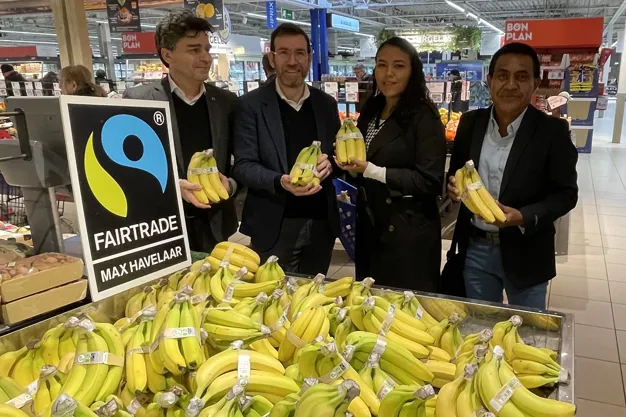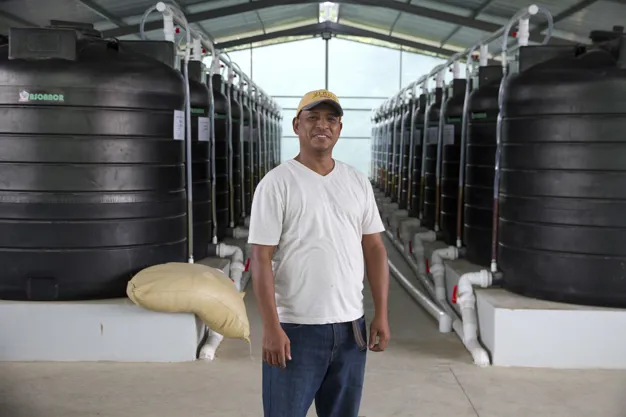On March 15th, François Vincent, Carrefour's director of traditional fresh products France, welcomed Reny Blanca Dianelly Reyes Silva and Santos Hipolito Ynga Ruiz, Peruvian producers of Fairtrade organic bananas, to a Carrefour store in the Essonne department. The meeting took place as part of the Fairtrade movement's sustainable banana development project, supported by Carrefour. The goal is to help improve incomes and working conditions for banana producers in Peru and the Dominican Republic.
 © CLAC
© CLAC
In both these countries, banana growing is a family activity from which growers derive their main, if not sole, source of income. In the face of climate change, world prices have dropped and production costs have increased so much that it is becoming difficult for growers to secure a decent income.
The Fair Trade and Sustainable Banana project (2021-2023) aims to support producers' activities through innovation in 11 cooperatives: 5 in Peru's Chira Valley and 6 in the northwest of the Dominican Republic. Implemented by the Latin American and Caribbean Network of Fair Trade Small Producers and Workers (CLAC) and the NGO Max Havelaar France, the project is financially supported by the French Development Agency (AFD) and Carrefour France.
Carlos Salcedo, fairtrade banana producer with the Peruvian cooperative CAPEBOSAN, part of the Fairtrade and sustainable banana project / © CLAC
Better living conditions
The actions undertaken have enabled over 1,000 banana growers to improve their living conditions in a sustainable way. 31% of producers now consider their livelihoods to be sustainable, compared with 4.4% at the start of the project in 2021. According to Blaise Desbordes, managing director of Max Havelaar France, "this project is unique in that it embodies a tripartite commitment, by the French government, a major banana retailer and an NGO. Together, they work on the key issues of the sustainable banana sector: decent pay, the environment, gender equality, generational renewal, quality…."
Higher yield per hectare
Between 2021 and 2023, the yield per hectare of organic fairtrade banana growers involved in the project has increased by 4.4% (from 1,279 to 1,335 cases of bananas per hectare per year). This higher yield was accompanied by a 23% reduction in product returns due to poor quality.
Over a three-year period, the project focused on four main objectives with the aim of strengthening the financial autonomy of producers and fostering their resilience to climate change:
- Improving soil fertility on banana plantations;
- Diversification of cultivation practices;
- Strengthening producers' management, marketing and communication skills;
- Inclusion of women and young people.
The Fair Trade and Sustainable Banana project has enabled producers to improve their yields and thus their livelihoods, by including elements of adaptation to climate change. 80% of production units now integrate sustainable practices into their processes, such as the use of organic fertilizers, conservation of soil organic matter, recycling of organic waste, water management and recycling….
93% of producers participating in the project use organic inputs produced by the micro-factories set up under the project. This saves 70-80% compared with other fertilizers, helps improve soil quality and makes the cooperatives more self-sufficient.
 Jorge Rodriguez, fairtrade banana producer with the ASOANOR cooperative in the Dominican Republic, in front of the organic inputs micro-factory set up as part of the project/ © CLAC
Jorge Rodriguez, fairtrade banana producer with the ASOANOR cooperative in the Dominican Republic, in front of the organic inputs micro-factory set up as part of the project/ © CLAC
Finally, production management now includes women, who occupy a third of management positions (29.73%) and feel more confident and empowered to express their opinions. Measures are also being taken to encourage young people to take over the banana sector, thus ensuring generational succession.
The project contributes to the Fairtrade movement's broader objectives of combating the injustices caused by globalized trade and improving the lives of male and female producers.
The second phase of the project, to be launched mid-May, will focus more specifically on achieving a living wage for Peruvian and Dominican producers of organic Fairtrade bananas.
For more information on our development programs:
Laurie Roubas: [email protected]
For more information on Fairtrade bananas:
Cyrielle Digout: [email protected]
